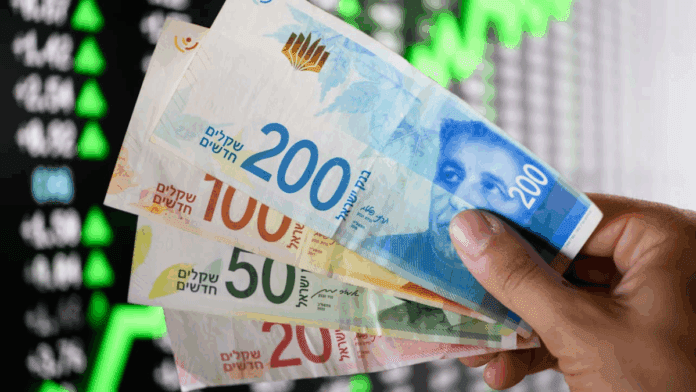Interest Rates Held Steady for the 12th Time
Israel’s central bank is expected to keep its main interest rate unchanged at 4.5% for the 12th time in a row. This decision shows that the policymakers are being cautious, despite strong signs that inflation is starting to ease.
Over the past several weeks, Israel’s currency, the shekel, has been gaining strength. The shekel recently reached its strongest level against the US dollar in three years. This improvement is mainly due to a ceasefire with Iran, which has helped reduce some of the financial risks facing the country.
When a country’s currency becomes stronger, imported goods become cheaper. This helps to lower inflation. That’s why many were hoping that the central bank would consider cutting interest rates. But officials have decided to wait and see how the stronger shekel actually affects prices before making any changes.
Most economists who took part in a recent survey predicted no change in rates. Only one expert believed there was a small chance of a cut of 0.25 percentage points.
Russia’s Interest Rate Shock: Businesses Choke as Kremlin Keeps Borrowing at 21%
Shekel Rally Offsets War and Labor Risks
The central bank’s governor has said that decisions about interest rates will be based on a balance of factors. On one side, the rising value of the shekel could help push inflation down. On the other side, labor shortages could make goods and services more expensive.
These labor shortages are happening because many workers are currently serving in the military’s reserves. With fewer people working, companies may raise wages or prices to deal with the shortage, which could lead to higher inflation.
Inflation in Israel is currently at 3.1%, which is still slightly above the official target range of 1% to 3%. This makes it harder for the bank to decide whether now is the right time to start lowering interest rates.
The central bank is also watching how the ongoing war with Hamas and tensions with Iran are affecting the economy. While the ceasefire with Iran helped strengthen the shekel, there are still challenges, especially with many people losing their homes due to missile strikes. Thousands of displaced families are now looking for new places to live, which is causing a spike in rental demand — especially in central Israel.
Even with these risks, the shekel’s recent performance is seen as a major positive sign. The currency has risen 6.4% against the dollar since the last interest rate decision. It has become the best-performing currency among major economies tracked by financial experts.
Israel warns China to crush Iran’s oil, stop nuclear threat
Market Confidence Grows, But Central Bank Stays Cautious
There are also signs that global investors are feeling more confident about Israel’s economy. A key indicator of this is the drop in the country’s five-year credit default swap spreads. These spreads measure the risk that a country might not be able to repay its debts. In Israel’s case, the spreads have fallen from 123 to 84 basis points in just a few weeks.
This stronger confidence can also be seen in the stock market. The Tel Aviv 35 index has surged more than 21% in the first half of the year. In comparison, the S&P 500 in the United States has only gone up by about 3%.
Despite this positive momentum, the central bank remains careful. Officials are waiting for more clear data before making any move. A statement from the bank is expected later today, along with updated economic forecasts.
These forecasts are likely to reflect slower growth this year. Back in April, the bank reduced its growth estimate for 2025 from 4% to 3.5%. The drop was mainly due to the continued military operation in Gaza and possible global economic headwinds.
While many experts believe that rate cuts could happen next year, for now, the bank’s focus is on keeping inflation under control. Policymakers want to be sure that the effects of the shekel rally are strong enough to offset any pressures from the ongoing war and labor market strains.
